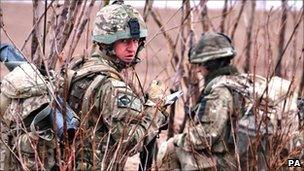UK reservists to receive £1.5bn training funding
- Published
- comments

The proposed changes would mean that more reservists would be trained for front-line duties
The government is to spend £1.5bn over the next 10 years to enhance the capability of the nation's military reserves.
Defence Secretary Liam Fox told the House of Commons that thousands more reservists would be trained for front-line operations.
This would result in the Territorial Army forming about 30% of a 120,000-strong army by 2020, he told MPs.
Labour said the announcement would mean regular troop cuts of 19,000.
The Treasury had agreed that the Ministry of Defence (MoD) could plan on the defence equipment and equipment support budget being increased by 1% a year in real terms between 2015/16 and 2020/21, the defence secretary also told MPs.
This increase in funding, he said, meant that the military could go ahead with military projects including:
procurement of 14 additional Chinook helicopters
upgrade of the Army's Warrior vehicles
spending on the Joint Strike Fighter project
procurement of the Rivet Joint intelligence and surveillance aircraft
equipment for the Queen Elizabeth class carriers
"Right from the start this government has been determined not to repeat the mistakes of the past and to make the difficult decisions that were ducked by the previous government," he said.
"We are determined to be bold and ambitious and build formidable, well-managed armed forces, structured for the rigours of future conflict and supported by an affordable defence programme."
Army balance
Dr Fox endorsed a review, external of reserve forces that says the UK should follow the United States, Canada and Australia in making more use of volunteers - like the Territorial Army - to man the front lines.
The idea is to ensure reservists are "properly trained and equipped" so that more soldiers, sailors and air personnel are ready for front-line duties.
The MoD has been trying to balance the books again since last October's defence review, external.
Dr Fox earlier told BBC Radio 4's Today programme that lack of investment over the years had meant the fighting strength of the reserve had fallen to about 14,000, creating an "imbalance".
He said: "As the capability of the Territorial Army improves, this will allow a progressive adjustment of the regular [and] reserve balance of the Army, while maintaining the land forces capability set out in the Strategic Defence and Security Review (SDSR)."
Scottish forces
He also announced to MPs major changes in the basing of forces, with RAF installations to be taken over by army units returning from Germany.
"The decisions we have taken in the SDSR to reduce aircraft types, bring the Army back from Germany and form the Army into five multi-role brigades (MRB) enable us to rationalise the Defence Estate and dispose of high-value sites no longer needed," he said.
"Army brigades currently stationed around Catterick and Salisbury will make up three of the five MRBs.
"The other two MRBs will be based in the east of England, centred on Cottesmore, and in Scotland, centred on Kirknewton, south of Edinburgh."
He also said the MRB based in Scotland would require a new training area and that "positive discussions are being taken forward with the Scottish Executive".
He added: "Two major units and a formation headquarters will be based at Leuchars. Consequently, the Typhoon force due to be built up there will instead be built up at RAF Lossiemouth.
"Other MRB units will be moved into Glencorse, Caledonia, Albemarle Barracks and eventually Arbroath, since over time we intend to bring the bulk of the Royal Marines together in the South West.
"We are also planning to place army units in Kinloss in around 2014/15."
It had already been announced that RAF Kinloss, in Moray, was to close.
Dr Fox said the plans outlined for Scotland would see an increase of more than 2,000 posts there.
In Northern Ireland, 19 Light Brigade will disband but other units returning from Germany will move into its bases.
RAF Marham in Norfolk, which had faced closure, will remain as a Tornado GR4 base, and the defence technical training programme will move to the former RAF base in Lyneham in Wiltshire.
'Fury in Fife'
Jim Murphy MP, Labour's shadow defence secretary, said the cuts in full-time soldiers would amount to just under a fifth of the entire force.
"It is hard to conclude anything other than that this is strategic shrinkage by stealth, because today's cut in the Army is bigger than the entire current deployment of all UK forces in Afghanistan.
"We welcome any additional investment in the equipment programme but many of the announcements today were announced last October, so we will look at the small print with care."
Speaking regarding the change in role for the Leuchars base, Mr Murphy said there would be "fury in Fife".
He said: "The RAF has been based in Leuchars for over 70 years and it is a matter of deep regret that the government has chosen to break this historic link that has served our nation in peace and conflict.
"It is clear that the government hasn't done its homework. They are closing this RAF base to make savings they haven't identified and redeploying the Army at costs they haven't quantified."
- Published18 July 2011
- Published17 July 2011
- Published17 July 2011
- Published22 June 2011
- Published22 March 2011